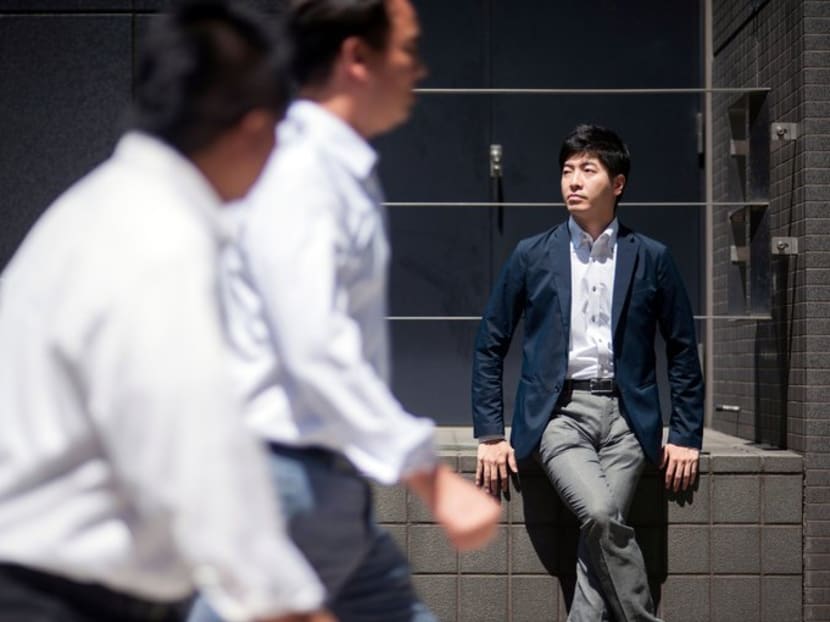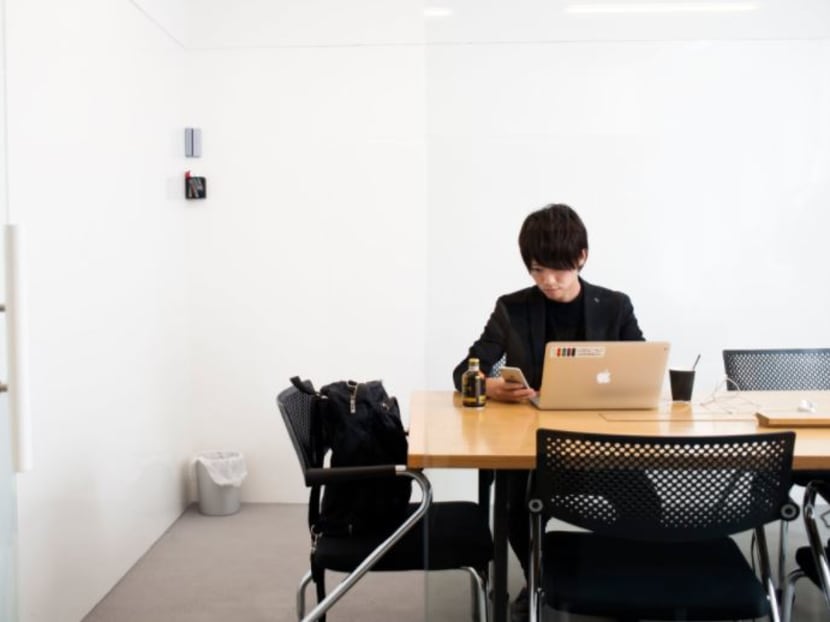To court workers, Japanese firms try being more gay-friendly
TOKYO — Once a week, the Japanese insurance company where Mr Shinsuke Nakamura works tries to enliven its morning staff meeting by having employees give personal presentations. The topics tend to be mostly innocuous: hobbies, pets or wine recommendations.

Mr Shunsuke Nakamura, 33, came out as gay to his co-workers at a major financial institution. “There was silence,” he said. Photo: THE NEW YORK TIMES
TOKYO — Once a week, the Japanese insurance company where Mr Shinsuke Nakamura works tries to enliven its morning staff meeting by having employees give personal presentations. The topics tend to be mostly innocuous: hobbies, pets or wine recommendations.
Nakamura used his turn, though, to come out as gay.
“There was silence. People were surprised,” Mr Nakamura, 33, said of his talk, which he gave to a group of about 50 colleagues last year.
His company, like many in Japan, is trying to become more gay-friendly. It recently extended family benefits to employees’ same-sex partners, and said it would allow its gay customers to name their partners as beneficiaries of its life insurance plans, something previously limited only to legally sanctioned, opposite-sex spouses.
Such changes have proliferated across the economy in recent years, with a rising number of goods and services targeting the gay community in what many Japanese describe as an “LGBT boom.”
It is a striking trend in a country where departures from the norm, sexual or otherwise, have long been something to keep hidden — especially at work. Being openly gay was something for niche transgressive pop stars; for the average gray-suited “salaryman,” it was all but unthinkable. And when it comes to the government, marriage for same-sex couples remains off limits.
But a combination of evolving social attitudes and competition for talent is forcing businesses here to adapt. As Japanese companies expand overseas, and increasingly face off against Western businesses at home, they are having to change how they hire.
“In Japan, the image of LGBT people is in transition, from invisible to open,” said Dr Ken Suzuki, who studies sexuality at Meiji University in Tokyo and is active in Japan’s gay-rights movement.
Yet the reality for gay Japanese workers is only starting to shift, and unspoken expectations of secrecy remain the norm. Mr Nakamura said his colleagues have been supportive, but that coming out at work was still seen as peculiar enough that his supervisors asked him to keep his company’s name out of this article. He reckons that, despite his employer’s efforts to be more inclusive, he is still the only one of the firm’s roughly 5,000 employees who is openly gay.
Dr Suzuki said the prevailing attitude toward homosexuality in Japan has long been “indifference rather than hate.” Where traditionalists in the United States have sought to root out gays, for example with anti-sodomy laws, “in Japan, people just don’t want to know,” he said.
Vibrant gay clubs operate freely in big cities here, but it remains relatively rare for people to come out to their families, let alone their co-workers and bosses. While surveys show the public is evenly split on gay marriage, organised political campaigning on the issue is still marginal. The government, which is dominated by conservatives, has mostly steered clear of the issue. Gay marriage has received no serious political debate.
“As far as the law is concerned, homosexuality doesn’t exist,” Dr Suzuki said.
Acceptance of this “don’t ask, don’t tell” approach is declining, however, as younger people insist on living more openly. Japan is also facing a painful shortage of labor, largely the result of low birthrates and limited immigration. That shortage is forcing employers to compete harder to attract workers, and advertising tolerance appeals to young people generally, not just sexual minorities.
Mr Kento Hoshi, a 23-year-old law school graduate, has seen that competition firsthand. He pitched his idea for Job Rainbow, an employment website aimed at gay people, in a business contest sponsored by Japanese tech companies two years ago. He won 10 million yen, or about S$12,320, and set up the site with his sister.

Job Rainbow initially offered information and tips only about companies perceived as gay-friendly, but today has 50,000 registered users and around 40 companies that pay to advertise job openings Recent help-wanted ads on the site sought information technology specialists, video game designers and electrical engineers while blue-chip employers like Japan Tobacco were listed as sponsors. Though it remains small compared to Japan’s main job sites, Mr Hoshi works on it full-time, and its rapid expansion illustrates the changes underway here.
Mr Hoshi said he was bullied for being gay at his all-boys middle school. On the internet, he read an article saying that around 5 per cent of people were gay.
“I thought, statistically, there must be one more in my class,” he said. “I felt relieved.”
Mr Hoshi joined a group for gay, bisexual and transgender students while in college. But when it came time to look for jobs, he felt pressure to conform. “I sometimes said I was part of an international relations club,” he said. “When I told the truth, the interviews went nowhere.”
He ended up taking a summer internship at Microsoft, where some of his Japanese colleagues were part of a company-supported network for gay employees. Outside of his small university circle, Mr Hoshi said, it was the first time he had met openly gay Japanese.
“There’s a lack of role models,” he said. But he believes things are changing. “Three or four years ago, if you came out people would say, ‘Huh?’ Now at least everyone knows what you’re talking about.”
Foreign companies are seen as easier places to be openly gay. And as Japanese companies expand, they are increasingly being pushed toward inclusiveness.
Mr Yusuke Kitamura runs the diversity and inclusion team at Nomura, Japan’s largest brokerage firm. Nomura introduced policies to accommodate gay employees and their families after it bought the European and Asian operations of Lehman Bros. following Lehman’s collapse in 2008.
But according to Mr Kitamura, only a handful of its 14,000 staff members in Japan have registered same-sex partners for benefits, something he blamed on ingrained aversion among Japanese to standing out and seeming disruptive.
Even if their symbolic value is great, the material rewards on offer are mostly small, meaning that employees who are reluctant to come out openly are unlikely to be swayed by them. For instance, Nomura gives employees a cash gift of 30,000 yen, when they get married, a benefit it now extends to same-sex couples in established relationships.
“No one’s going to come out for 30,000 yen,” Mr Kitamura said. “We have a system in place. Now it’s about changing the culture.”
There are signs of that happening. This year, at the urging of an activist group led by Suzuki, the northern city of Sapporo began issuing partnership certificates to same-sex couples, a first for a Japanese city. The move followed the introduction of a similar system in the Shibuya ward of Tokyo in 2015.
The certificates carry no legal weight — in Japan, marriage law is determined by the national government, not local authorities — but they have provided a degree of official sanction to the emerging equality movement and brought some tangible benefits. Public housing authorities in Sapporo and Shibuya, for example, are required to recognize as spouses any tenants who have acquired the certificates.
Still, the pace of progress has been slow. That is something Mr Nakamura, the insurance worker, linked to Japan’s general emphasis on conformity.
“There’s this idea that everyone has to line up in a neat row, not just when it comes to sexuality,” he said.
Mr Nakamura said life at the office has been mostly normal since he came out. After his colleagues got over their initial surprise, many offered encouragement. He has been treated well, he said, with only a little bit of awkwardness.
“Sometimes people can be overly conscious,” he said. “At least people have stopped asking me if I have a girlfriend, or when am I going to get married.” THE NEW YORK TIMES






